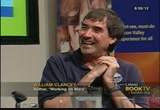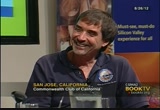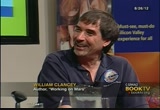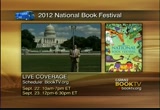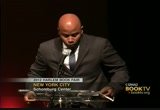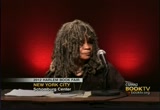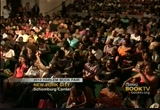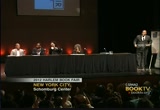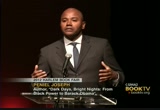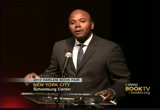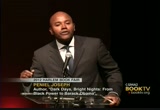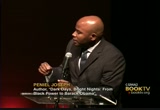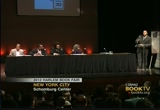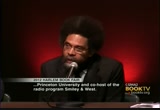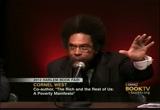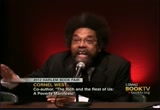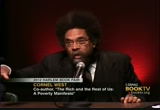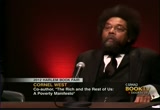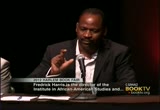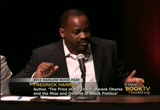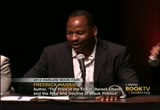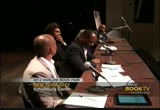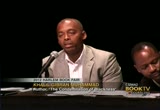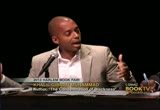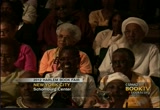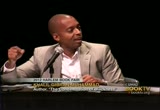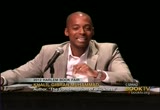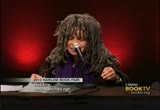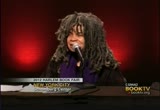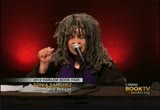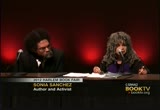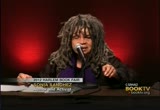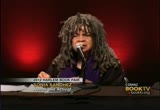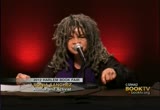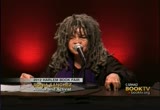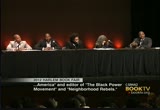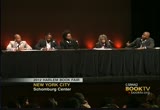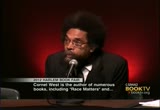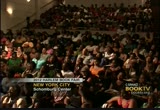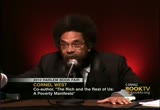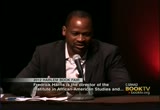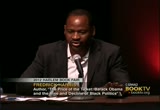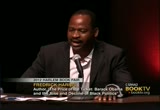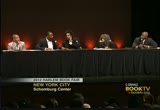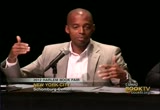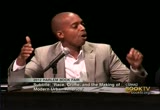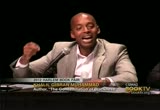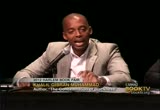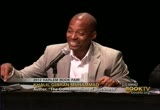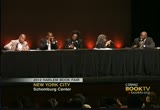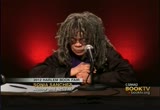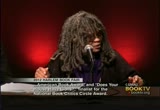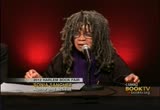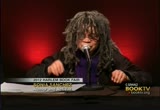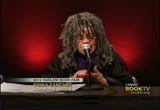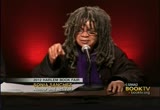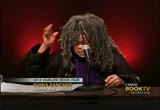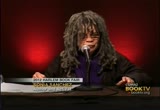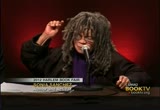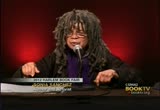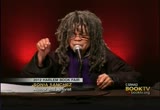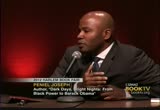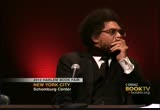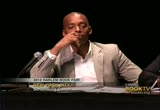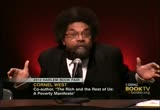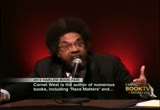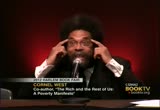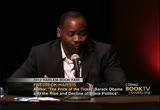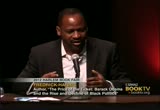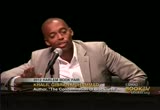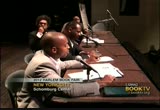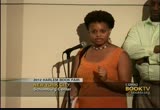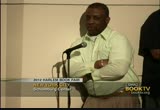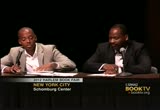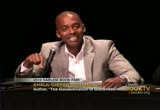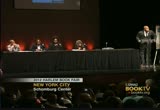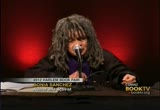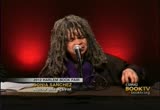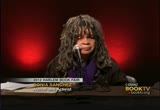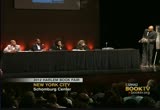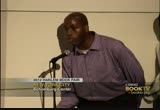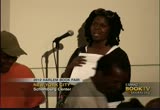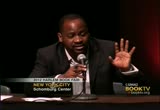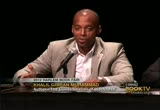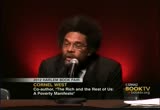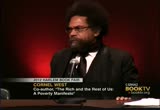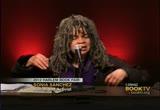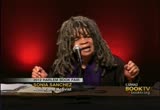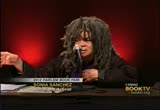tv Book TV CSPAN September 16, 2012 2:45am-4:15am EDT
2:48 am
2:49 am
welcome to the decision 2012 great democracy and the new jim crow. we have a standing-room-only audience at the harlem book fair. as a native new yorker i am very proud to be here with this panel of luminaries. i am going to do a brief introduction and i am going to set the stage for what is going to follow. we've got sonia sanchez. [applause] professor b8 is a national and international treasurer. she's a human rights activist, poet, civil rights activist, feminist, humanist, mother, teacher, daughter, and really one of the heroic figures of the post civil-rights and civil rights of black power era. her latest book is morning haiku and she has edited 44
2:50 am
african-american writers on the election of barack obama, 44th president of the united states. [applause] next we have professor cornell west. [applause] with cornell as we all know is another national and international icon and in national treasure in his own right. he is a professor of civil rights activists philosopher, human rights activist who and really one of the boldest public intellectuals that we have in the united states today. he speaks truth to power even when when he speaks is unpopular
2:51 am
he has the structure to be critical and against the grain even when it's hurt him and is standing in the black community. so cornell's latest book is the rich and the rest of us and we are proud and happy to have him here today. [applause] next we have fred harris, who is professor of political science at columbia university where he directs the institute for research and african-american studies. [applause] professor harris's latest book is the price of the ticket, barack obama and the rise and decline of black politics and professor harris is one of the leading scholars of african-american politics in the united states today. [applause] last but not least, we have
2:52 am
khalil gibran muhammad. [applause] who is the director of the schomburg center for research and black history and culture. and he is also the author of a brilliant but a condemnation of blackness, race, crime and the making of modern urban america that places the issue of race and crime and a black criminality and mass incarceration in the proper historical context in the united states today. [applause] >> before i sit down i would like to talk about what we will be talking about this afternoon. decision 2012 race and democracy. i speak about race and democracy in my work often and sometimes people tell me how can you talk
2:53 am
about race and democracy in the black radicalism? isn't that a contradiction? malcolm x famously called american democracy nothing more than american hypocrisy. martin luther king jr. spoke truth to power to the day he died between 1965 to 1968 like his biographer said he literally becomes a pillar of fire talking against the vietnam war talking about political and economic inequality and talking about the triple threats of militarism, materialism and racism on the body politics. 44 years after martin luther king jr.'s death, those threats remain. we think that the new jim-crow on one level we think about michele alexander's best-selling book about mass incarceration and the african-american community. what i want to do today is extend that metaphor beyond just incarceration.
2:54 am
we are going to dhaka but incarceration today but i want to expend that to public schools, to racial, political and economic inequality to the death of trayvon martin sheeran harlem to the issues of police brutality to our foreign policy and the drone that checks against innocent globalist. i want to extend the metaphor of the new jim crow to the new tax on the voting rights for african-americans and minorities in places like florida and all over the united states. i want to extend that metaphor of the new jim crow to the political and public policy assault on poor black women that continues to this day. i want to extend that metaphor to the hip-hop generation and generations of young black men and women who we are writing off today as we speak as a nation
2:55 am
because we do not care whether they can read, write, have food, suffering from malnutrition, whether they can be productive citizens in the 21st century so i want to have a conversation that connects the metaphor of the new jim-crow to the decision that we face in 2012, and the reelection of barack obama or the election of mitt romney. what does that mean that we have from the civil rights to the barack obama era that african-american poverty has actually increased. what does it mean that the african-american incarceration since 1954 have exploded. what does it mean that the material circumstances for millions of black people are worse now than they were during the 1954 brown decision during the age of jim crow? the first person i would want to ask is brother cornell west
2:56 am
because you've been very vocal in your criticism of the president of the united states even to the point where some people have accused you of being a traitor and some people have said cornell brother west why are you speaking out of turn? the right wing attacking this man and remember the right wing is attacking president obama. they're saying that he party is attacking this man, the movement is attacking this man. i want to throw out a question to you that isn't about attacking president obama but placing his idea of the decision 2012 and reset democracy in its proper historical context what is the reelection of barack obama for issues of racial, political, economic inequality, issues of mass incarceration? issues of domestic racism, issues of police brutality, trayvon martin and also the international context. what does it mean?
2:57 am
and if it doesn't mean a release of some of these ills we are suffering from, where can we go to get relief? >> you put a lot on the table. [laughter] i want to thank dr. joseph for his leadership and i want to acknowledge my dear brother max robinson for 14 years not bringing us together and of course the leader of this institution professor herricks and the iconic sonya sanchez. let us never forget sylvia's restaurant i was at the tribute for curtis mayfield last night. 70 years he would be.
2:58 am
[applause] born june 3rd, 1942 died december 26 and at the tribute, you could feel the love, the courage, the willingness to sacrifice the music of the genius that dropped out of high school but let the world know that he came from a great people and tradition that said he was bowing to respect the people and of to tell the truth planning and that turning on the black keys on the piano. that is the tradition that i come from. that's the tradition i come from. so any time people say you're trashing the president with an trash in any system that treats human beings of humanity is not a firm bid if you are the head of that system the fundamental question is will you side with everyday people or side with the oligarchs on the top? i don't care what color they are. that is a moral question. that is a spiritual question and
2:59 am
on a christian, too so why don't worry about folks saying things about me. i have another criteria by judge myself by. but when we look at the reelection, i say that the system itself is so decrepit that this point that the oligarchs have dominated and there's a culture of deformity that all about money and the obsession of the even commandment that all shall not get caught. scandal after scandal we are seeing the recession of the culture and it doesn't begin in the hood, it begins on wall street. [applause] it begins in the corporate elite of the 1% that 135% of the wealth and get the top 83% of the income in the last year and a half and the rest of us wrestling with so the choice for me is on the one hand mitt
3:00 am
romney would be a catastrophe, a capital c, catastrophe, reinforcing the oligarchy and the conformity and reinforcing the mendacity. but then i look at barack obama and wrestled with a brother, 65 events i did for the brother. what we see the last three years suffering lady, poverty increasing, more decrepit school system, the privatizing of it. so i.c.e. mitt romney catastrophe the capitol see. obama so far for poor people, disaster. look at the present industrial complex, look at our poor children, look at working people. is disaster better than catastrophe? help yes. [laughter] because catastrophe means
3:01 am
explicit crypto fascist possibilities. for barack obama neola will part of the system that is in the process of collapsing slowly so he might constitute a break but then my look at the foreign policy and the national defence act and the tannin folks without trial and the u.s. citizens when i look he looks at every tuesday and he decides to to kill that sounds like disaster to me to. we are between the rock and a hard place. >> third-party possible that these. most importantly voting isn't the sole form of being active. we need organizing, mobilizing, and we would love to have a social movement if possible.
3:02 am
>> that's great. i want to follow up with the political scientists about this. what are your thoughts? >> you put me between a rock and a hard place to come after cornell west. but i'm going to try. the good doctor is absolutely right. african-americans are between a rock and a hard place. but the president, i've been critical of the president. i had rocks thrown at me recently that the president house for instance we should give him credit with a health care reform bill. i think that's very important. a fifth of african-americans are uninsured. but i also think cornell was going on that part of this is our fault, too because we haven't held the president's seat to the fire. there's been other constituents.
3:03 am
we are a constituency in the democratic party so the question for me is not with a black president is doing for black folks. the question ought to be what is this democratic president doing for the most loyal constituency of the democratic party. there is no other constituency in the country that gives 95% of its vote to one party so there been other constituencies in difficult positions of the gay and lesbian movement which is i would applaud it. it's great that they've gotten their issues on the table, and i should say that it also benefits african-americans gays and lesbians so we should acknowledge that, too. but also when it comes to issues around racial inequality, this administration i think has been missing in action and i want people to go back because i think there is some emmy show going on particularly about what happened when barack obama was down with black voters and
3:04 am
hillary had him out and there was a march talking about social movements around the event. several weeks later at harvard university, barack obama gave one of the most progressive criminal-justice reform talks proposals i've heard from any presidential candidate. what did he promise? he promised a federal level racial profiling wall. he promised loan forgiveness to the law students that could decide to become public defenders in order to level the playing field for people who can't afford lawyers. he said he would encourage the states to do away with the death penalty. what happens to that barack obama? part of the problem is i think as a community you talk about the right wing. we have been more protective of the president, then pressuring him into action like other constituencies. so in many ways, if there's a second term and i do hope there is a second term because it would be a disaster for the
3:05 am
catastrophe we are going to -- this week and not going on, we can't criticize you. i'm under attack. that bill will collapse after the second inauguration. and i hope that people hopefully -- on the other hand, she may also have to confront another republican dominated president and a very conservative senate. i have dreams about this or rather nightmares that the only thing i see that could come on the very progressive and is the second midterm when the american people get so fed up that unfortunately it's great to be only two years to turn this thing around and so, that is my best hope at the moment. [applause] but i am hearing is what fred said and cornell said in terms of the disappointment with the
3:06 am
president is some of the black community got confused and confused barack obama with martin luther king. when we look -- and i said this before publicly. when we look at dr. king and lyndon johnson, dr. king as the civil-rights champion and the hero of his generation. when we look at barack obama, barack obama is the president of the united states. when you ask most black people if they would get a picture of barack obama, they are looking at a civil rights activist when in fact barack obama is at martin luther king jr.. he is not frederick douglass, he is abraham lincoln, and i think that we have gotten that confused in the black community. >> i just said something i'm glad i wasn't miced. i said on a good day. you're absolutely right. i want to address this from an educational standpoint because i
3:07 am
think that's what is often not accounted for in this back-and-forth as to whether we should support the president or we shouldn't support the president. i would like to say what would you tell a 12 year old about the significance of his first presidency in light of the world that they live? in light of the experiences that many of those black and brown 12-year-olds have walking the streets to this city or a 12-year-old growing up in southern indiana having nothing but the generations? what would you say to them? because he does represent in the purest tradition of american exceptional was in a kind of black ratio. he didn't come from nothing. but he represents the in possible made possible. he is the leader of the free world representing western
3:08 am
european traditions that have never happened before. a member of the minority party representing the nation's interest. so, we have heard a lot over the last few years about -- and i am going to natural lit down to the specific terms about no more excuses for young black boys and young black girls who are underachieving now that the president, barack obama and michelle obama are in the white house, how could you not recognize how hard and how important it is to work hard to live up to those aspirations? i can see documentary after the gentry, special report after special report ask young people now that you see this first family in the white house will if you think about getting married one day? as if we are so pathological and dysfunctional that it would take the symbolism of a black family in the white house to even have the thought that one might actually decide to marry one day. [applause] as a side note marriage is a
3:09 am
declining institution in the world. and yet we, that is, those over african-americans bear the burden of somehow representing the decline of marriage. in 1970 as many of you know, 30% was the then crisis number for the female households, children born to single women. they produced the moynihan report and it continues to shape over the next 40 years of the policies around poverty in this country. the rate of white children born to single women at the time was about 3%. that number has grown tenfold in the past 40 years. it's now the crisis number that was the case for black folks 40 years ago. have you heard any reports about the crisis of the family into the pathology actually there is one. charles murray wrote it but there has been no continued conversation about it. so, for me, the presidency opposes the problem and the opportunity of pointing out the
3:10 am
3:11 am
second presidency in terms what they want to see in what kind of world they want to be living in. they means they have to be equipped to speak up for the rights they have, the entitle element they deserve, and a quality of life that should be govern -- guaranteed to them. [applause] >> i want you to -- [inaudible] lots of things, oarveg. it's an honor to be here. a place i discovered jean hudson many years ago. being from new york, went for a job, in fact i got a telegram, they don't do telegrams anymore do they? it said report to work at 9:00 a.m. i answered an ad in "the new
3:12 am
york times" that said they needed a writer for the film. by golly, i sent a copy of my writing and cv and i got a telegram said report to work on monday. i showed up not at 9:00 because i department want to do cp time. i showed up at 8:30 a.m. blue suit, heels, and hat and gloves. and i had the telegram. when the receptionist came in. i showed her the telegram. have you ever had people look at something and look at you and look at something and look at you and at something. i walked in and sat down at quarter to nine the guy came in. a head came around and another he said and said i'm sorry the job is taken. i said how can that be? i just got here. i used my new york humor. i said i got it. i was due at nine. i'll go back outside and wait
3:13 am
fifteen minutes and the guy said lady, it's taken. i got it. discrimination i'm going to report to the urban league and the guy slugged his shoulders. i was so mad, you new yorkers know i got on the number two train to go to the urban league office. i was mad the door closed and i ended up on the train that going to 110 the street. i got off the 125th cross the street a quarter a away that said shop boring library. i pick up my hat and gloves and i said to the man, what is this? please. and he said, it's called if? he said go in but sign in first. and i walked in and there was mrs. hod comp behind the glass door and there was scholars long tables just books stacked high. not looking up and i knocked on
3:14 am
the glass door and i told the story. i said what is in? she said my dear, we have books here only by black people. and i said, it must not be many in here. [laughter] she never ever let me forget that. every year i brought my students there. she said i have a story to tell about your professor. [laughter] and she told it every time. the story they i want to tell it that we deserve the presidents we get. we deserve the comem and women we get. we deserve everybody we get. the mayor, we deserve every bloody person we get because it's up to us. it is we who must decide. [applause] you know it. you know it. and you know that you know it. if we elect somebody to do it. how could we do it?
3:15 am
it's an empire, people. come on. it's a wild word, look it up it's an empire and nothing changes unless we the people remember. we the people, they're talking about us and we the people. we is the people. i know, i teach english. we is the people. you know and if we the people elect someone to sit back and said okay now you do. it's impossible. it's an impossibility to do it. you know it and i know it. you see. that's what i'm saying. we got what we deserve. you know, and let me take it a step further. we didn't want any radicals. most blacks aren't that radical today. most people are not radical today. you know, people still look -- [inaudible] doing the same thing sanchez? i said what is that? i said i've been teaching for 40 years. i taught your children and grandchildren. i taught them and i taught them,
3:16 am
what did i teach them? what does it mean to be human? what does mean to be -- [inaudible] what does it mean to be a slave that we could go in the classroom and teach your children how to be human. that's what we did. you know it and i know it. whenever but the point is simply we lean back on our eyes and shut our eyes and pretended we don't see. we see behind our eyes. we knew he was not radical. we knew coming out of chicago what kind of politics he was coming out of. we're not crazy. we come out of new york politics. and we knew that. we knew about him and middle class people. they're not working class people. they will invite me to the white house or him to the white house. they don't want to see us. when they see us they a history that goes back to martin, malcom, it does. it really does. you see, and that's real.
3:17 am
and but we have -- [inaudible] it is indeed what we have said what have written that produced an obama. okay. , you know. [applause] and we needed to hold him to it. we needed to him to hold him to the history and we have not done that. i was looking for -- if i can't find it now. it begins a piece they do talking about coming out of period, right. here it is. if you want to create a new body, then you must step out of the river of your own memory and see the world as if for the first time. that's what we got to do. you can't come in with the same old memories and say by golly i'm creating something new. i say no. you have the same. you are indeed thinking the same thoughts every day when you do that. and the part of all of this is to begin think new thoughts bhap we must do without children to
3:18 am
make them a new way of look agent worlds. in other words one of the thing i do and we don't have time for that i do with children and, i mean, children, children and college children it's the whole point. something negative comes comes in the idiot box, the television movies whatever. you have to children to recognize to say that is an negative image. ly not take it in. i will give it back to you. that's psychology. we haven't taught our children to do that. we haven't taught our adults to do that. o, did you see? no. it wasn't good. [laughter] because you ain't act like it's good. that's what i'm talking about. and then what i call substitution substitute a memory. a good thought. we must type our children to do that. that's what we talk about what
3:19 am
it means to be human. we are on the right road and discussing this in a real sense. [applause] i want to talk about this issue of democracy. and i want to open this up to the entire panel. >> you mean democracy in america what it should look like. >> i want to con tect lose it. the panel has written about democracy. i want to go back to dr. martin luther king, jr. i often do. in 1963 in birmingham alabama in prison king talking about the great well of democracy. and what dr. king meant by the great wealth of democracy. he said the young black teens and the ten and 8 and 9-year-old girls were being arrested in april and may children's cur said. he said they were bringing the nation back to the those great wealth of democracy and rededucted in a tradition he was
3:20 am
accurate that one day people would recognize these young abused people as brings the nation back to the great wealth of democracy. you've written a book called "democracy matter." sometimes my work has been criticized for talking about democracy. what i talk about is the small democracy of carmichael in alabama. and in jackson, mississippi and mississippi delta. the democracy i talk about is that i believe in is fannie lou haimer meant by small disple and ruralville mississippi making less than $2 a day. or eel will baker who was telling people that democracy was more than just a hamburger or sit in movement. i want to connect the idea of democracy we think that so often after 2008 election we thought it stopped with barack obama. i want to talk about democracy
3:21 am
in the new age jim ceo. how -- [inaudible] that can actually create a peoples' movement. a social movement like we had the 1960s and '70s and 50s that can lead to france formation. i'm interested in notion and grappling with notion of democracy. again, it's not the democracy that the united states projectings. it's a democracy that the black people have dragged this country into expanding with their blood. [inaudible] >> i would argue that the black freedom movement has been the grandest example of democratic struggle. by democratic struggle, i mean, with -- [inaudible] what dignity meant of every day people. if you really affirm the dignity of every day people, they're not going choose poverty. they're not going to choose poor housing or poor school systems or levels unemployment and under
3:22 am
employment for 45 years. it's at that very deep level. you see, i think we have to be honest with ourselves and that is and all of those folks that you named. fannie lou, martin, malcom, we can go on and on and on. >> that's right. >> their love of black people made them a threat to black people. see we don't like to deal with that. when martin was shot, 72% of americans disapproved. 75% of black people disapiewfed of martin. i was in buffalo a few weeks ago, 300 people showed up in a sift 1200 because black preacher mobilized against martin calling him a communism because he was the war because he loved vietnam babies. he was a threat to black people when he was shot. i wrote a song called "we live
3:23 am
in the threat." he understands. in a deep sense, you see, when you really love a folk who have been taught to hate themselves, get ready for scars. get ready for abuse keep your smile, keep your love, keep your witness, and die. then they'll celebrate you. because it's comfortable. because it's convenient. but when you really love folk, then it means so you to bare witness that doesn't put them down but is critical of them to know and say you have the potential to be a martin or curtis, or donny hathaway or eel ella baker. there are so many nameless ella baker out there or anonymous martins out there on the ground. in the end, what are we talking about? whether you love those folk, who are threatened by your love, you
3:24 am
better be willing to die by the folk who contempt for you. part of our problem is, we black leaders who gave in e sell out and no longer want to die because they no longer have the same kind of love. they want careers. they don't want calling. [applause] >> that's right. >> [inaudible] >> yeah. yet another big question. [laughter] democracy, yeah. i want to focus internally a bit as cornell did about our own institutions. and one of the most important freedom writing institutions in our community from slavery to reconstruction to modern civil rights movement and the post has been the church and the question is where is the black church at the home.
3:25 am
there are theological tensions going on. the tensions between a gospel of prosper i -- and so we have haven't worked it out yet, right. and we see scandal. talking about politicians in scandals. there have been big church scandals lately. and the quo is, about accountability can go wide and deep. not only our politicians people that we put into office or religious institutions and the question is are we holding those people accountability for what they're doing. and so, i think we need to focus, you know, black people are very talented. we can do lots of things at the same time. so that means that there are plult. things that need to be going on. we need social movements, internal accountability, we need the pressure, you know, from the president to the governor to our local officials to really respond to these issues.
3:26 am
i mean, i was part of the silent martha went on father's day. and what i was struck by, it was organized by the naacp. i didn't see many or very little church contentions there. right. it was sunday afternoon, you know, i know some of our minister too old long time, i wondered around 2*u where were the leading clergy issues. >> [inaudible conversations] >> right. right. right. okay. yeah. there are hundreds of churches here. hurnldz of churches here. i'm sure you can talk about who was missing doing the occupy wall street movement. >> [inaudible conversations] what i'm saying is there lots of needs within our community i think that the grassroots mobilization needs to be get back to the fundamentals about the basic of institution and
3:27 am
building capacity building that can bring people, black youth and also to transport these skills and knowledge to a new generation or future generation. you know, one of the things about, you know, i read about civil rights movement, is the importance of young people being a part of social change. learning from the old generations even though they challenged the older generation. >> that's a good thing! >> but this generation transfer of knowledge and i think -- and memory. memory is very important thing. and what another piece of this that i'm concerned about, i mentioned this in the book in the concluded chapter of my book "the price of ticket" is the attention between the new narrative about the national memory. which you talked about earlier about you know what you can be. right. that the time line is being shifted not from slavery to
3:28 am
freedom to civil rights to post civil rights but before barack obama and after barack obama. right. and what that is going to mean for the telling of our history. or the memory the loss of memory from one generation to the next. so i think there's a lot of at stake here. and so, you know, i'll leave it at that. >> thank you. >> yeah. >> that's actually a great transition. i believe -- and there are more and more people framing the this shall way. could we be -- [inaudible] or approaching a nadir that produces a necessity for the third reconstruction. the only way you can actually assess space and time, the only way you can figure out where you are in the world is to actually know something about the past. be able to measure and make relative judgments about progress. and when you wipe away two generations of history from
3:29 am
young poem people -- [inaudible] published a report for those who haven't heard or read about it. september of 2011, issued a report that had many findings. two i'll mention. one was that out of 50 states, 35 states required no curriculum educational requirements for teaching civil rights history. either no or very little. they graded them with these score of an f. the highest score was 70% in new york state fell into their category. we're talking about giving a who perform at 70. everybody at here is a professor or one kind or another. that's not acceptable. but what it tells you, it tells how important even the easiest of narratives about american's exceptionalism it could do this, it could respond to the cries of
3:30 am
those small demands of every day people. by passing legislation a second time. to get it right. that's an easy narrative to teach. in the second finding, the out of 12,000 high school seniors, they were asked the question, what is the brown v board decision, and why did it matter? only 2% could answer both parts of the question correctly. so it's not an accident that in two generations since the civil rights movement that -- it's not about education that the point. there's no education. and i'm not saying the big education, i'm talking about on history. on the level of culture and historical literacy that actually, and you see it in real time animates the work of the tea party. the tea party is -- they may have their facts, as i understand them wrong. they may misinterpret history, but they have been fired up by
3:31 am
narrative that drn sit in the world and the world they want to be in. [applause] we are simply the walking dead. when it comes to the world moving around us and not being able to latch on to something and say hey, something things are not as they appear. i'm not surprised that cornell was in "the matrix." because -- [laughter] right. outreach. because that absence of historical knowledge making possible the retreat even voting rights. i had a conversation today with someone that ask will do you think that the move against voter participation and the necessity for voter id cards and the new requirements is deliberate? [laughter] and i thought, are you deading -- are you kidding me? yes, dc distribute.
3:32 am
more importantly and the most telling aspect. we've heard a lot of about felony disfranchisement. how it puts george bush in office because the number of votes that were not counted by x fellows in state of florida who had regained the right vote for any number of reasons at polling places were not allowed to vote. i said to the person, did you know the felonies disfranchisement laws were written at the height of the emergence of egg gracious when the all-white primary was passed and the grandfather clauses were put in tax and poll tax and literacy tax. if you think it was racist then. if we could say it was a terrible time. it was racist time. thank god we have freedom today. thank god we were able to elect a president. the same law that were put on the books in 1980 are the same law of the state of alabama, florida ab and others are
3:33 am
envoting today to keep people off the poll. if you didn't know that, if you didn't know that, you would be many black voters and latinos saying on talk raid radio. why is that so bad? chris rock talks about black people having another way of talking. why shouldn't we have an voter? isn't that a rest of the world particularly in european country where we measure ourself in historical term against you get as many people to vote as possible. that's what democracy actually looks like. that's how you guarantee the populous is invested in the outcome and participating in civil society. so we actually have to be mindful of that path and make sure our kids respect that path and understand it so they can go into the future of saying, this doesn't look right. >> yeah. >> thank you. [applause]
3:34 am
well i'm always a poet, you know. i woke up this morning with my eyes and i woke up this morning with my eyes on [inaudible] eyes on cornell woke up with this morning with my eyes on frederick. going to lead, going to resist, going to teach just like that. i'd be on the panel there are good people up here, you know. i'm the only woman, if some of you picked that out. [applause] [cheering and applause] >> i'll tell you, -- were called but you were chosen. >> what are we going? one of the things they just -- and there is a bunch of stuff. we must create new ways of learning and struggles. we must challenge always and give ideas that sail home like a
3:35 am
poem. give -- [inaudible] right of the first tongue, the right to discover and love other and tell our own stories. [inaudible] awoman, awoman! give us a -- [inaudible] alice walker poem and story stretching against an ever changing sky with jus ease and intelligent effect of duty. we have organized students at love and trust and dedication. give us the student activists. [inaudible] who sailed into battle knowing their words of activism would change the world. remember a month ago when john stood up in the congress. when he said -- [inaudible] someone from georgia talking about trying to pass something and change something, and then john got up and he was john
3:36 am
lewis again. he was not a congress person. i sat next to him in a place called atlanta. i walked in and said thank you thank you for being here this thank you for having that history. thank you for your activism and say are you out of your mind? you will not change something you worked hard for. you have to understand that history. you know, we cannot go and study it. we can't go walking across the bridge, you know, and say i participated in this. no you didn't. you walked across a bridge. [laughter] [applause] make your own bloody bridges to walk across. walk across the bridges that -- [inaudible] at some point. you have to hear what i'm saying. we should have been all of us down there at wall street. that's a bridge we have to walk across and see and deal with, you know. we need very touch walk into the churches, i'm not being negative now.
3:37 am
walk into the churches something up to gay people and let them you know what i mean? [applause] we need do what i did. when they said i give them the speech and people cheer and say mom that was god. and the pastor got up berated the fact of lesbians and gays and what was happening to gay men the thing calls aids that was good whatever aside my children said, -- like let's get out of here. let's leave. and they brought me their stuff and i stood there. my ancestors were mat at me. you aren't getting out of here until you say something. you have to tune into your ancestors. you can't ignore the voices. you can't tell people about the voice. they're going put you away. [laughter] but they're all day working with the voicings ancestors. they are telling us what it is
3:38 am
we must do. one of the things i said, after you finish that they got up and saying the most beautiful storm. i did this to him and we smiled. i said as church got up and stamped their feet. wasn't that brilliant song? we have so happy to have brothers like that in which church. and then said, let me tell you something, and i responded there. the people who stood up and clapped for me and didn't stamp their feet and clap for me when i said what i said. so you to hear that. what you're saying in the community, we would choose them which will applaud for. we choose the people applaud for. it if you come up with something we don't understand and like, right, you know, we we'll send you home without a clap or light clap of, you know, she's -- he's so political. she's going come up with that stuff, you know. that perhaps, you know, alarms
3:39 am
us. it should alarm you. it should alarm you. what we must do, is that we are here, why are we here? why the bloody panels i've been watching all day long? why are you here? why did you come up? you came out to hear people. you clap and say -- there was bad dude and sisters. what does that mean? what does translate in terms of your life? and what you are doing do? how does it translate on your job and in your church in your moisk whoever you go on the work place? how does translate in your home. >> you beat your wife. how does it translate? you beat your children still. how does it translate you raping your niece or nephew. how does it translate in your home all the good stuff you're doing and walk pass me and i know you're a pedophile. how does it work? it works and so you to hear what
3:40 am
i'm saying. i say it with love and respect. what we are talking about now is ourselves. we are not talk about -- we in a state where we have. we brought ourselves to this state. [applause] nobody did it to us. question it ourself. you know, i understand being -- [inaudible] what it means. i know, what region's policy did to and bush eels policy. we come out of tradition. the history being ensaved. and they did stuff to us and people escaped. harriet tubman helped out and got people free. yes. how do we use -- [inaudible] [applause] how do we allow ourselves to lose -- [inaudible] where we live where we grew up. you know, where, you know, here we are in the place so we have
3:41 am
to do now is identify the shared room and freedom spaces we women and men and children grapple the fact that give us a new identity in the world. we have to organize the comes. you know how people say stuff about us. i said it years ago i think you were there in a place called new orleans when i said simply we have to have a committee of engineering. that any time someone says something about any of us, right, whatever, the next day in the it "times" "l.a. times" "the washington post there would be a rebuttal. and we have is like, you know, concerns cynicism. concerned intellectuals. i don't care what name it is there. we have to do that. why? and the black newspaper and the latino newspapers said so you to run that ad for free whatever. go to the supermarket and my children don't want to two with me. they said you spend too long. i'm not shopping for food for
3:42 am
two hours. people said how should i think about this? what should i do. how do i and a half gait my job and school is what do i do to survive? and that's what i'm talking about. we really do have to understand that. and again, we have got initiate peace again in our homes. in our schools, and our churches and our synagogues and hearts and country in the world. a peace movement. go in the peace room, the peace room whatever, you know. i'm serious about that. you know why? you know, we should have taken a employment of silence for what happened yesterday. you know, at that movie house. someone said to me, what do you mean they shouldn't have been at movie place? what does it mean you can't go places you want to go in the so-called democracy and the so-called place called america.
3:43 am
right but the point is that how in the world do you buy that kind of ammunition? that kind of gun. you know, who sells that? and, you know, why in this country are people allowed to go in and buy weapons that will shoot through stone? and concrete, people? just think about that, you know. >> it's called a national rifle association. >> i know that! [applause] >> and we -- what do we say about that as a people. let me finish one minute. i know. okay. okay. okay. [applause] [laughter] [applause] >> if you have your time. >> yeah. let us initiate peace, you know, in our cities and states. i was in a place years ago before columbine happened and i gave talk a and ten students waited and came to me at 10:00 and speaking on a book tour and
3:44 am
i'm begin to go tomorrow and get up late and go to california and sleep late. i have nothing to do the rest of the day and they said can you come to our school tomorrow? they said what time? can. i said i'm going sleep late. they said because they were being bullied and called names. two of the friend were grey. i said pick me up at 7:30 in the morning. and they picked up in a car, my brothers and sisters it looked like it was held together with rubber bands. okay. but those students that organized an assembly, and i got up and said a couple of poems to get them in my corner. i read how dare you? one of the things i said at corner of each floor there should be a celt, a table, and a bench or chair with a bell that if you feel you're going hit somebody ring that bell or
3:45 am
asking somebody to talk about it. if you think you're going to be beat up. rick that bell and have somebody sit and talk to you. we need one in the white house, in the congress, in your homes, in your school, the churches. whoever because we need these peace sides now. and one of the things i'm doing in the place called philadelphia is that i'm doing a peace mural. and tony morrison, alice walker, maillot anglo, -- no. i haven't been in contact yet. all these people have -- [inaudible] peace about haiku about peace too. we are going have chairs along the way so people can contemplate peace. not war, peace. not killing, peace. because at the core of the business is all that money we
3:46 am
spend in the place called iraq and office right, we could take this money and rebuild this place called america. you know it and i know it too. [applause] >> all right i'm going to throw out one more question. we're going open it up to questions from the audience. we love to hear you speak, sister. no apologies. when we think about the next three years, i'll start with you professor west. the next three years in respective of who gets elected president, we're facing all these challenges but we're facing these historical milestones inspect 2013 tees 50th anniversary of bathrooming ham, alabama the march on speech by dr. king. assassination of med gar veafs. it is a radical speech king is talking about reparation. we have to struggle and go to
3:47 am
jail together to get that belostled community multiracial democracy. in 2014 it's going to be the 50th anniversary of the civil rights act and mississippi freedom summer. the summer project where the three civil righters were kill assassinated that year. it's the 50th of atlanta city and fannie lou and mississippi democratic party. it's the 50th of dr. king in saint august teen florida. the 50th of so many things. in 2015, of selma, voting rights act and the civil rights movement forced a president to say we shall overcome. remember hilary and barack obama had that battle. was lyndon johnson and mlk. barack obama said mlk given these milestone,s that emergency room cog dhash coming up.
3:48 am
we see in the election opened up opportunities for all of us. especially those who write and agent and are active about issue. we see brother on television now we see different people. whether we degree disagree 0 with the new black faces peopled needed negro face in higher place. they're calling you. people were professor -- [inaudible conversations] what does it mean? space opened up. space opened up. what does it mean for us the milestones whrorntd obama gets reelected. the civil rights milestones. they were talking about how miseducated or no education. the 50th ankers anniversary. is going to have talk about king and civil rights. what can bedo?
3:49 am
what is the opportunity that is there for us. >> one i think barack obama is going to win. mitt romney is justice sense of -- [inaudible] he is going to win. but for me, you know, it's the 41st anniversary of what's going on and raised a question. marvin gay raised the question. who really cares? you wouldn't have mark fannie, any of these folk. you wouldn't have sonia if they didn't care or love. didn't have power in their courage and for me, the fundamental thing we have to do is break the back of the new jim crow and let our young people know we care for you, we love you we're not going allow the police to and and frisk you. we have karl dickses here and l tell mely bailor from the black agenda report. one year ago -- anybody want to
3:50 am
talk about -- [inaudible] every person is precious. when it comes to the chocolate side of town -- [laughter] i got deep love. we have a lot of black folks who love everybody but black people. that's not a kind of love i'm talking about. i'm talk about the cross. that's everybody. it starts with the least of these. if with can break the back of the new jim crow and this is crucial because we know if white brothers and sisters were going to jail at the same level of intensity and black brothers and sisters there'd be a national emergency tomorrow. no doubt. and if black middle class brothers and sisters, some of our jack and jill brothers and sisters who i love deeply, if they were going to jail in the same level on the black were going to jail, we'll have
3:51 am
different kind of black loip. we simply say i don't care what lass will teesha, we love you, we care for you, we're going to fight for you and that's contact exactly what we did. a person got arrested here in harlem. we want young people no know we are old school and love you and care for you. we're going go to jail for you. we'll die for you. we'll tell the truth about your suffering and even though you name bad choices i know you are up against the system. billions of dollars at top. crumbs at bottom. fighting over the crumbs. coming in from the side. drugs coming in from outside. schools not wort a dime. families collapse because of unemployment and medication and addiction and giving up and selling out. we simply say, you come from a great people who cared. you come from a great people who loved. we go all always remember and resist in light of remembrance
3:52 am
with the same love you heard sonya putting forward in a poetic way. much more eloquent than i can. love, love all the way down. >> thank you. [applause] we're going keep it short so we can get questions from the audience. >> just briefly. i think those milestones you mention will be important. i don't think they're going to bring that much opportunity. as we have seen with the commemoration is that i mentioned a moment ago. you have a i are writes of our history. it's now about american tryoff over the racist past and so what gets wrapped up is a pulse racialism. >> is there a way to gatt that? >> yes, e to organize. i'm about memory. because memory is connected to communities and we're dependent on people who, you know, have been said the witnesses those
3:53 am
people who bear witness and those people who have heard those who have beared witness and so again, it's getting to the generational importance of memory. i think one of the most pour lessons i group up. i'm from atlanta gray. georgia i wasn't born in jim ceo i knew people who lived through it. it wasn't a great experience for them. but as we hear the narratives the good old days when back people together and the schools were all black and, you know, it was all wonderful. i heard different stories about that. i heard different stories. my great grandma who i knew she turned 00 i was a kid. and the first time i heard the word liferlging is from her. she was going through family photographs, and she came through at photograph and i asked what happened to, you know, my great, great grandfather. she shut down, she said, he was
3:54 am
lynched. i'm an 8-year-old what is lynch? and that opened up all kind of possibilities of history and memory and what it meant and connecting those personal stories to a wider greater history african-american experience. so when we talk about the commemoration, i think those stories need to be here. not what the white house said not what the people, you know, in power or even the african-american museum say. we need to put forth the people who have survived jim ceo to tell their story so we know what the sacrifices are being made and what we need to go forward. nibble history with a purpose teaspoon powerful. it is the ultimate protects of our humidity. it is the stories we tell. we had 0 stories long before we had statistical regressions.
3:55 am
[laughter] if do you continue don't know what i mean. we live in a world at the time we think we know what we know because somebody put a number to it. it gets in way of knowing what we should always have known before someone had to tell us something. we're human beings that we love, we socialize, and show compassion toward one another. that's how we got here. history has to be fist and foremost in the work we do with each other and with our young people. so shameless plug. it matters schoenberg center has been carrying the fight for 85 years. 86th year now. [applause] i can say with sincerity and awe then usty every single person on the panel has learned what they know and can speak the truth to
3:56 am
power they speak because of something they found here and explored. so if you value, if you value history as a weapon of our humanitarian, then so you to support the institution that make history possible. that bring it to life. so that's not the schoenberg, there are many institutions. support thememory and history that keep it alive. >> okay. [inaudible] we have a long line of questions. we only have about ten minutes left. can you state a question, please. no comment. thank you. >> no thanks. i just -- my name is -- [inaudible] and i just found "the social network" president issue. trying to develop a conversation like you're having today that conversation you're having today. i'm missing it at home and my family and church they're missing. it i know they're having the conversation i hear them. i need a networking of the
3:57 am
conversation. my question is how do i graduated from -- graduated from harvard university and i need to have -- [applause] the students i was around at harvard we have phenomenal conversation. i need to know, i'm in new york now. how do i develop more of a connection defeat these kinds of conversation and networking of these conversation. >> thank you. >> who wants to answer that? >> it's a wonderful system. give that brother a hug for me. i think the important thick for you to give your address on the internet so the people all around the world will be able to relate to you in that conversation. president issue responsibility -- president responsibility.com. >> next. >> [inaudible] there's a bunch of things i want to ask. in respect to what you the panel
3:58 am
were discussing earlier about the reason we're here. in respect to the panel before. i would show what's going on in the educational system. what's gong prison industrial and the military complex. given the fact i see perspectively we're seeing the country turn around, turn the back particularly on black and hispanic and asians as well give the fact i think i'm see what needs to be in the 1800st the panel where you had the -- [inaudible] that was object to put black anemia jail because corporation profit from it in the day. >> you say the question, please? >> yes, i'm posting that question to the panel. i like to hear them elaborate. it seems with the -- [inaudible] >> can you just say a short question. because i don't have time. >> i want to pose that. i want the panel to each to elaborate on it from their point of view. the objective they see for black people in the country. >> criminalization as was true
3:59 am
after the end of slavery was primary instrument of racial domination. it was intended to control the bodies of black people for the purposes of extracting profit from them. and it took many, many forms but the system itself always stood there as a throat, if you step out of line. that has become the newest form of controlling the population. it's different redundant, people, not about extracting labor of black people. we have private prison problem. the private prisons are still small enough in our collective economy not to be about making big profit out of the exploiting behind prison walls. it's about private cormings making money on wall street because they can sell the same services as private corporations that state agencies can't offer at the same prices. but the key difference here is that it's criminalization
4:00 am
function today to disappear people who are not essential to the body policy. who are not essential to the democratic of neoliberalism. in the purpose it may have changed. in the function, it is the same. >> thank you. [applause] >> question? good afternoon. my name is leslie author. two quick questions. is occupy wall street a social movement, and why didn't the black community embrace occupy wrote? >> thank you. social motion. not yet a social movement. social motion, social monumental and something beautiful called a social movement of people fighting again. if began social motion. i was there and it should have been more chocolate. >> okay. >> good afternoon my name is donald browne.
4:01 am
first of all, as a nation of people, in america, the population of over 50 million. with an annual income of almost $1 trillion why asking anybody forking in. i go to china town and use their culture as -- [inaudible] sister sonia said what happened to harlem. why are we asking anybody for anything? [applause] we stimdon't love ourselves. we have not come to that reality that we really black people said if in the '60s an people sang it and -- [inaudible] went on television and said a couple of things and made movies a and whatever. at the core in order to really say we must come together, because the most important thing that we must deal with at the time is economic power.
4:02 am
the chinese in china town have economic power. others do too. you can't come out there by yourself. you have to come as a group. a group of people to do that and then we have to asome point understand the importance of culture. we don't understand -- we really don't. we simply at some point were moved with the people that we enjoy. not with the people that sometimes makes think, makes angry, makes wonder about our own lives who we are. whatever. the point is simply it's got to be an economic structure here period. and it is placed called harlem, we politicians who sold us out. we can't get away it there it. it's happened. we watched it happen and we kept sending people back and back the same people who did the same thing to us. we have responsibility, we keep saying what people do to us. what do we do to ourself and how do we are we going reimagine
4:03 am
ourself here in this 21st century? we haven't stopped think about that. we haven't had a sit-down at the schoenberg where we all come no tv, nothing and sit con and begin to talk about how are we going reimagine ourself outside the classroom. outside being professors. outside being head of will this place. how can we reimagine ourself in the africans of place called america. almost of middle of the 21st century. how do we see ourself in the construct. we are not talking about our thinking about it. but how do we get this new gig, how do we get a new job? how can question bet on television. how do we make a movie or cd? how do we in the sense finish our disaration. what does it mean to our people what finish it or not if we're not bringing it to our people and explaining to them as economics person what happened to us and harlem and all the harlems of america? >> thank you.
4:04 am
[applause] yes, sir. >> [inaudible] my name is carol. thank you. your words are important. one question is, how do we cultivate an interest in history and her story? and i ask that because i teach [inaudible] my friem if i don't stand over a student and give a lot of quizzes they won't finish reading it [inaudible] women's voices too. same thing. my question is how do we cultivate an interest in our young people reading our stories, and personally writing a series of plays on the president's who own slaves. how do i -- thank you. >> thank you. >> this is last question. so i want everybody to just answer one minute. thank you. >> you are cultivating an interest.
4:05 am
there's no immediate results. there's no immediate payoff. erin in this -- everyone in this room is more than likely because they were here were exposed to the same literature, to the same historical figures. the same set of ideas. i was. and yet i was heading to wall street about twenty years ago. so you have to plant the seeds. if you don't plant the seeds, they will never grow. but so you to at the minimal plant the seed and nurture the seed. you have to water them. >> thank you. >> excuse me. we're going to take three questions. if you're going to ask the questions and panel list can answer whatever questions. up with of the last three. we have to ask three questions. >> go ahead. >> sure. [laughter] all right. my question is sonya sanchez. my question is to you have feel
4:06 am
in many way are we in a position right now we are dislecting our responsibility and -- [inaudible] because in many wayses as black people we look at someone to serve but not -- [inaudible] -- we got the question. thank you. >> next question. good afternoon my question for the panel is that in light of our discussion here today and enlightment that you brought to us. what would be the chances of a willing commitment from the panel or from some of your colleagues to come back to to meet here at shon burg and have the discussions. that's a great question. >> next question. last question. >> hi, good afternoon. [inaudible] i'm a graduate of harvard university and nyu law school. i have practice. my question is about the body of
4:07 am
politics. really criticizing the president or criticizing elected leader is actually easy because they're one person. they're one of select people, you know, it does, by the way, matter that barack obama does have nuclear black family. that matters. that's well. i'm 40. it matters for his wife michelle obama and his kids and how black relationships should be. my question, here's my question. my question is, i what should the body policy -- what should black people doing a opposed to what the you think they aren't doing. what should we do boing? >> thank you. one thing we should be doing is coming up with a clear agenda like other stwebts have these are the top things we think are important. this is what we want you to do.
4:08 am
and not just from president also the congress, it mayors. governors, and it starts on the local state and national level. so a clear agenda. that's something our community has gotten away from. >> quick response. we should repeal drug laws. we should end severe punishment such a mandatory minimum. they are clear action items. you ask people what you vote for from the smallest to the highest. what is the position. we should expensive -- $5 00,000 to go in and save people who are so angry that are willing to shoot each other over the slightest infrank sinatra. we should have. paid internship. do everything for free. if you adultses to give back to young people, they should paid
4:09 am
because we live in capitalist world. would we reimagine that work as cooperative and spirit. in the meantime, next week you want to be involved pay somebody to help somebody else. that will make a difference. the rhetoric about volunteerism is really a upper class elite paradigm. it is people who have the luxury because everything else is taking care of to give back. when you're working two jobs and trying to make ends meet and somebody looks at you and say are you mentors a child? it's a cheap solution to a excellencive problem. >> thank you. cornell? [applause] i'm trying to highlight the way in which the system under which he live is corrupt. it is dying. the money that is at the time. when i talk about breaking back
4:10 am
of jim crow. that is something concrete because it means -- [inaudible] it means what? an assault ban on assault weapons. it means? housing with quality. it means what? how come students can't get loans at the same level of interest group that wall street banks do which is 0. [applause] it means what? where is the money? when the military -- [inaudible] can spend $4 wl in a week but we gate program of $4 billion for three years and supposed to break dance over it. no, that's a poor priority. having is wrong. that's what, i mean, by concrete demands. i don't want people think it's a matter of criticizing the president. i don't care what color of the president is other than the fact that in symbolic ways i'm glad it is a beautiful black family. michelle obama is there with the children. that's symbolic.
4:11 am
4:12 am
i guaranteed income you know, we need to have people who are poor now, people who don't have jobs, we need a guaranteed income for them. listen to that. she said i worked hard for my money i wont give a guaranteed income to someone that isn't working because the money that they put on the of war bring it home and give it to people. you have to make people feel good about themselves again. i guaranteed income means people would get money to live. stay home, take care of their children, moved as human beings. you can't deny that humanity. but above all we've got to become activists again. we can't sit back and say i
4:13 am
experienced talk to the bridge 25 years later but now i have to cross that bridge all these bridges we are coming to at this point and these are distinct bridges, my brothers and sisters. we could become extinct as of people in this hemisphere. i would not have said that in the 20th century, but i watch and i see how we let them privatize our schools and have a select group of people running things, a group of black folks running things they say. what we must do is activate public schools again. there's nothing wrong with public schools we just need to put people in their teaching them that care about what is going on but it's up to us. it's up to us as a people to say let us begin again to do the work. that is we are going to live, we are going to love and resist. most important word is resist. we are calling to resist. i will come once a week, once a
4:14 am
month, twice a month, whatever, to have conversations about where are we, where are we going, and the other thing is even though barack obama didn't run, we should have a black cabinet. it can be official and unofficial but if he does something wrong we will send him a letter telling him what he is doing wrong. we need a black cabinet people, yes. i've said it from the jury beginning and at the moment he was elected we need a black cabinet. come on all you people. say we is your black cabinet. [laughter] [applause] >> let's give a big round of applause. thank you very much. there's going to be a
161 Views
IN COLLECTIONS
CSPAN2 Television Archive
Television Archive  Television Archive News Search Service
Television Archive News Search Service 
Uploaded by TV Archive on

 Live Music Archive
Live Music Archive Librivox Free Audio
Librivox Free Audio Metropolitan Museum
Metropolitan Museum Cleveland Museum of Art
Cleveland Museum of Art Internet Arcade
Internet Arcade Console Living Room
Console Living Room Books to Borrow
Books to Borrow Open Library
Open Library TV News
TV News Understanding 9/11
Understanding 9/11